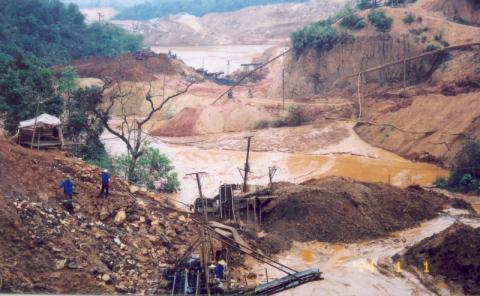Miners Stir Discontent As They Continue Selling Ore On The Cheap

VietNamNet Bridge - A report from the General Department of Customs (GDC) found that ore and minerals that Vietnam exports to China are much cheaper than exports to other markets.

Minerals must be preserved and used in the most effective way
In the first four months of the year, Vietnam exported 1.5 million tons of ore and minerals and had export turnover of $65.5 million, which means the average export price of VND988,000 per ton.
The exports to China amounted to 80 percent of total exports, 1.2 million tons. However, as the average export price was VND560,000 ton only, the export turnover was modest, $29 million.
The prices of minerals sold to South Korea were 10 times higher than to China, at VND5.8 million per ton.
The exports to China amounted to 80 percent of total exports, 1.2 million tons. However, as the average export price was VND560,000 ton only, the export turnover was modest, $29 million. |
Le Huy Ba, former director of the Institute of Science, Technology and Environmental Management, said this has been occurring for many years.
“Why does Vietnam sell ores and minerals cheaply to China? What can Vietnam get in exchange for this?” he asked.
“It will be dangerous if Vietnam also sells rare earth and other valuable ores so cheaply. State management agencies must give explanations,” he said.
He said that economic relations among countries are fair, so Vietnam should not and does not have to sell natural resources cheaply to any country.
Minerals are non-renewable natural resources and must be preserved and used in the most effective way. “It is dangerous to sell raw resources, and it would be even more dangerous to sell raw resources as low prices,” Ba said.
“We once exported coal to China and then have to import coal from China at high prices. But we still cannot learn a lesson from this,” he commented.
The expert doesn’t believe that the short geographical distance between Vietnam and China and the low transportation costs are the reasons behind the low export prices.
An analyst noted that if state management agencies continue lax control over mineral exploitation and sale, Vietnam’s natural resources will be depleted soon. The money to be collected from natural resources sale is modest.
International institutions have repeatedly warned of China's ambition to control the world market. They have bought a lot of large mines all over the world, using exclusive supplies as a tool to control prices and force large companies to invest in China in exchange for precious materials.
China restricts mineral exploitation in the country, but tries to collect minerals from foreign sources or join forces with partners to explore minerals overseas and bring to China.
RELATED NEWS
Ore mining industry suffers setbacks
Cross-border iron ore smuggling: the real concern
Mai Thanh
Vietjet Launches Four Routes Linking Top Destinations Of Việt Nam And India
Vietjet has officially launched four more services linking top destinations of Việt Nam and India including HCM Ci... Read more
Sacombank To Recruit 300 Staff By July
Sacombank is set to hire 300 employees by the end of July for positions like personal/corporate customer service ass... Read more
"Fly First-Pay Later" By MOVI And Vietjet Wins Technology Award
“Fly first - Pay later” is an 100 per cent online financial product that first appeared on the Vietnamese market... Read more
EXIM Thailand Opens Representative Office In HCM City, Inks Credit Deal With BIDV
The Export-Import Bank of Thailand has agreed to provide the Bank for Investment and Development of Việt Nam with ... Read more
Vietjet Launches Two Routes To India
The two newest routes, which will operate 3 and 4 round-trip flights per week respectively, are expected to continu... Read more
Vietjet Develops E-logistics, Pays 20 Per Cent Stock Dividend
The budget carrier expects to earn more than VNĐ22.3 trillion (US$959 million) in air transport revenue in 2022 Read more

